Research Questions: Interview Alternatives and Avoidance Strategies
VerifiedAdded on 2023/05/30
|6
|1428
|250
Homework Assignment
AI Summary
This document provides a comprehensive analysis of various interview techniques, including unstructured, stress, behavioral, case, and panel interviews. It details the characteristics, purposes, and examples of each type, offering insights into their practical applications. The assignment also explores the pitfalls to avoid when crafting research questions, such as loaded, leading, and double-barreled questions, providing examples of each to illustrate their negative impact on research quality. Furthermore, the document includes a list of references to support the information presented. This assignment serves as a valuable resource for understanding effective interviewing strategies and the importance of well-formulated research questions.
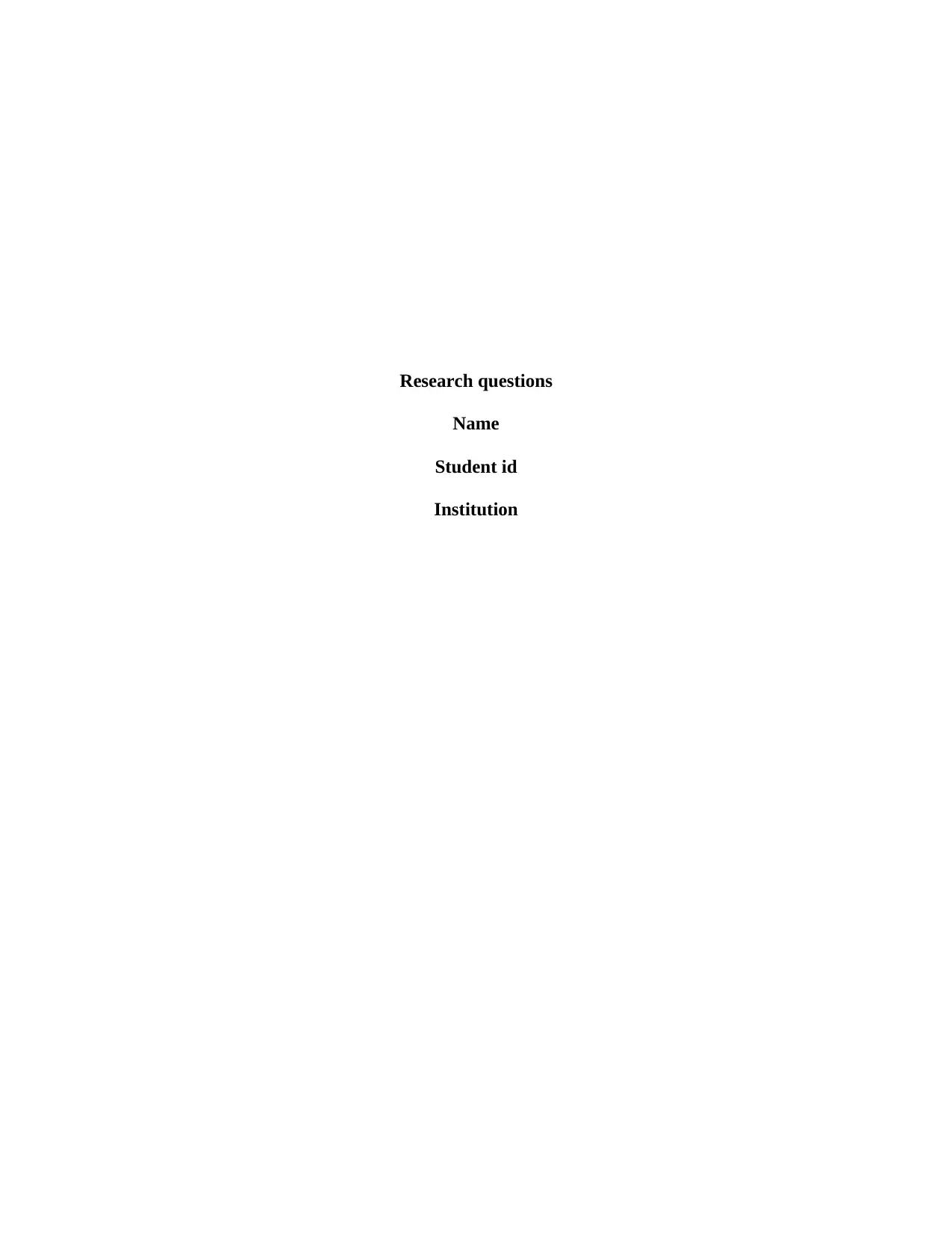
Research questions
Name
Student id
Institution
Name
Student id
Institution
Paraphrase This Document
Need a fresh take? Get an instant paraphrase of this document with our AI Paraphraser
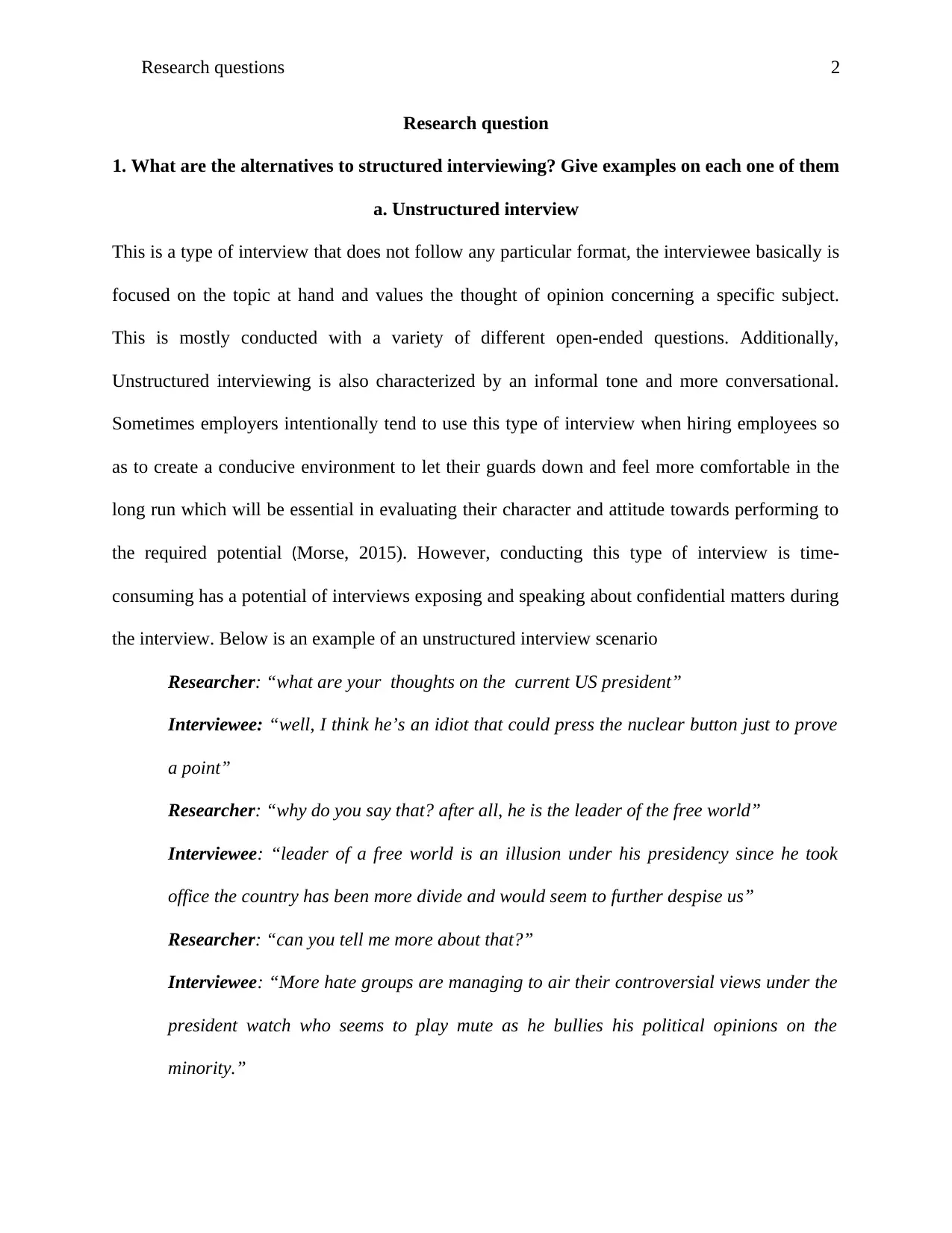
Research questions 2
Research question
1. What are the alternatives to structured interviewing? Give examples on each one of them
a. Unstructured interview
This is a type of interview that does not follow any particular format, the interviewee basically is
focused on the topic at hand and values the thought of opinion concerning a specific subject.
This is mostly conducted with a variety of different open-ended questions. Additionally,
Unstructured interviewing is also characterized by an informal tone and more conversational.
Sometimes employers intentionally tend to use this type of interview when hiring employees so
as to create a conducive environment to let their guards down and feel more comfortable in the
long run which will be essential in evaluating their character and attitude towards performing to
the required potential (Morse, 2015). However, conducting this type of interview is time-
consuming has a potential of interviews exposing and speaking about confidential matters during
the interview. Below is an example of an unstructured interview scenario
Researcher: “what are your thoughts on the current US president”
Interviewee: “well, I think he’s an idiot that could press the nuclear button just to prove
a point”
Researcher: “why do you say that? after all, he is the leader of the free world”
Interviewee: “leader of a free world is an illusion under his presidency since he took
office the country has been more divide and would seem to further despise us”
Researcher: “can you tell me more about that?”
Interviewee: “More hate groups are managing to air their controversial views under the
president watch who seems to play mute as he bullies his political opinions on the
minority.”
Research question
1. What are the alternatives to structured interviewing? Give examples on each one of them
a. Unstructured interview
This is a type of interview that does not follow any particular format, the interviewee basically is
focused on the topic at hand and values the thought of opinion concerning a specific subject.
This is mostly conducted with a variety of different open-ended questions. Additionally,
Unstructured interviewing is also characterized by an informal tone and more conversational.
Sometimes employers intentionally tend to use this type of interview when hiring employees so
as to create a conducive environment to let their guards down and feel more comfortable in the
long run which will be essential in evaluating their character and attitude towards performing to
the required potential (Morse, 2015). However, conducting this type of interview is time-
consuming has a potential of interviews exposing and speaking about confidential matters during
the interview. Below is an example of an unstructured interview scenario
Researcher: “what are your thoughts on the current US president”
Interviewee: “well, I think he’s an idiot that could press the nuclear button just to prove
a point”
Researcher: “why do you say that? after all, he is the leader of the free world”
Interviewee: “leader of a free world is an illusion under his presidency since he took
office the country has been more divide and would seem to further despise us”
Researcher: “can you tell me more about that?”
Interviewee: “More hate groups are managing to air their controversial views under the
president watch who seems to play mute as he bullies his political opinions on the
minority.”
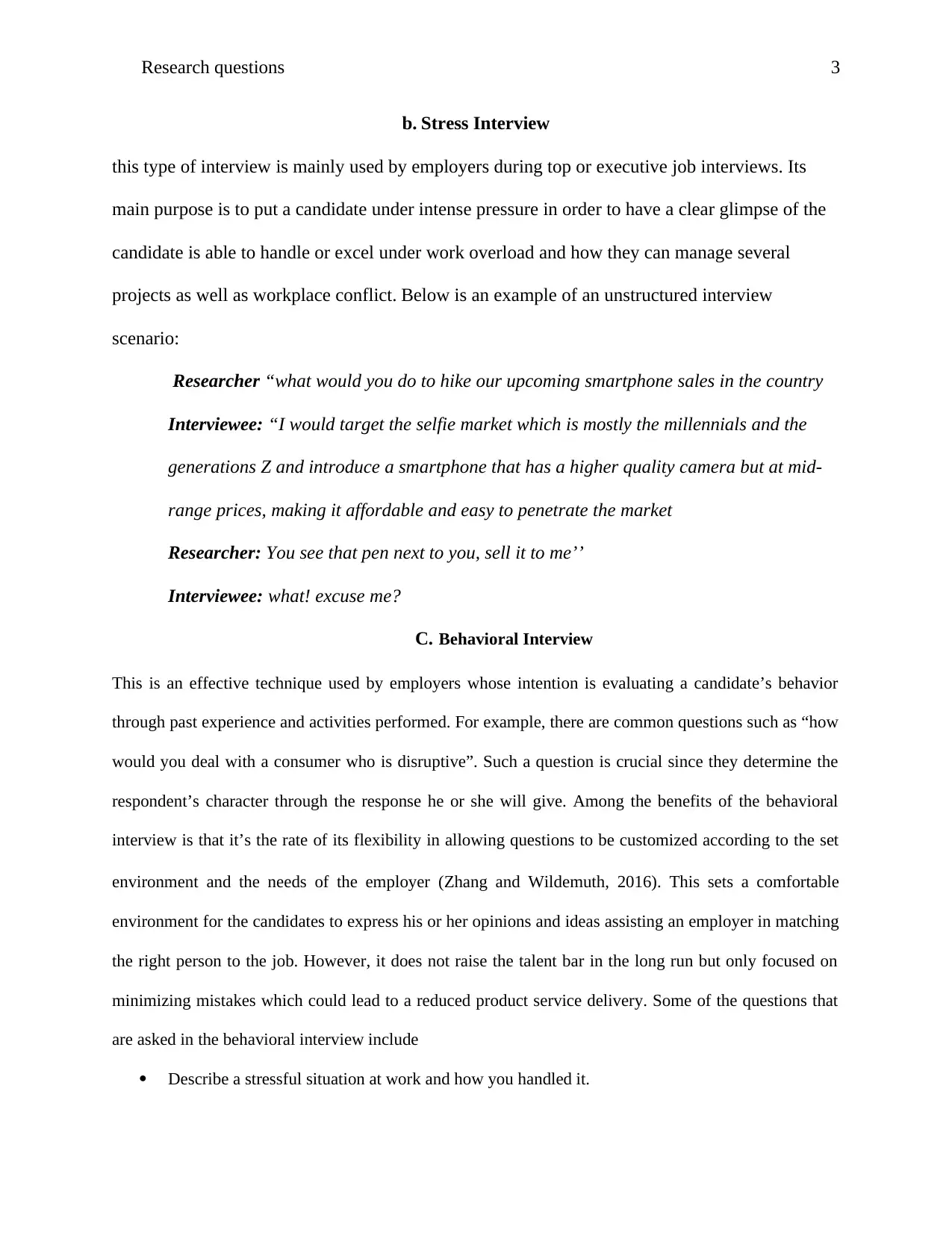
Research questions 3
b. Stress Interview
this type of interview is mainly used by employers during top or executive job interviews. Its
main purpose is to put a candidate under intense pressure in order to have a clear glimpse of the
candidate is able to handle or excel under work overload and how they can manage several
projects as well as workplace conflict. Below is an example of an unstructured interview
scenario:
Researcher “what would you do to hike our upcoming smartphone sales in the country
Interviewee: “I would target the selfie market which is mostly the millennials and the
generations Z and introduce a smartphone that has a higher quality camera but at mid-
range prices, making it affordable and easy to penetrate the market
Researcher: You see that pen next to you, sell it to me’’
Interviewee: what! excuse me?
C. Behavioral Interview
This is an effective technique used by employers whose intention is evaluating a candidate’s behavior
through past experience and activities performed. For example, there are common questions such as “how
would you deal with a consumer who is disruptive”. Such a question is crucial since they determine the
respondent’s character through the response he or she will give. Among the benefits of the behavioral
interview is that it’s the rate of its flexibility in allowing questions to be customized according to the set
environment and the needs of the employer (Zhang and Wildemuth, 2016). This sets a comfortable
environment for the candidates to express his or her opinions and ideas assisting an employer in matching
the right person to the job. However, it does not raise the talent bar in the long run but only focused on
minimizing mistakes which could lead to a reduced product service delivery. Some of the questions that
are asked in the behavioral interview include
Describe a stressful situation at work and how you handled it.
b. Stress Interview
this type of interview is mainly used by employers during top or executive job interviews. Its
main purpose is to put a candidate under intense pressure in order to have a clear glimpse of the
candidate is able to handle or excel under work overload and how they can manage several
projects as well as workplace conflict. Below is an example of an unstructured interview
scenario:
Researcher “what would you do to hike our upcoming smartphone sales in the country
Interviewee: “I would target the selfie market which is mostly the millennials and the
generations Z and introduce a smartphone that has a higher quality camera but at mid-
range prices, making it affordable and easy to penetrate the market
Researcher: You see that pen next to you, sell it to me’’
Interviewee: what! excuse me?
C. Behavioral Interview
This is an effective technique used by employers whose intention is evaluating a candidate’s behavior
through past experience and activities performed. For example, there are common questions such as “how
would you deal with a consumer who is disruptive”. Such a question is crucial since they determine the
respondent’s character through the response he or she will give. Among the benefits of the behavioral
interview is that it’s the rate of its flexibility in allowing questions to be customized according to the set
environment and the needs of the employer (Zhang and Wildemuth, 2016). This sets a comfortable
environment for the candidates to express his or her opinions and ideas assisting an employer in matching
the right person to the job. However, it does not raise the talent bar in the long run but only focused on
minimizing mistakes which could lead to a reduced product service delivery. Some of the questions that
are asked in the behavioral interview include
Describe a stressful situation at work and how you handled it.
⊘ This is a preview!⊘
Do you want full access?
Subscribe today to unlock all pages.

Trusted by 1+ million students worldwide
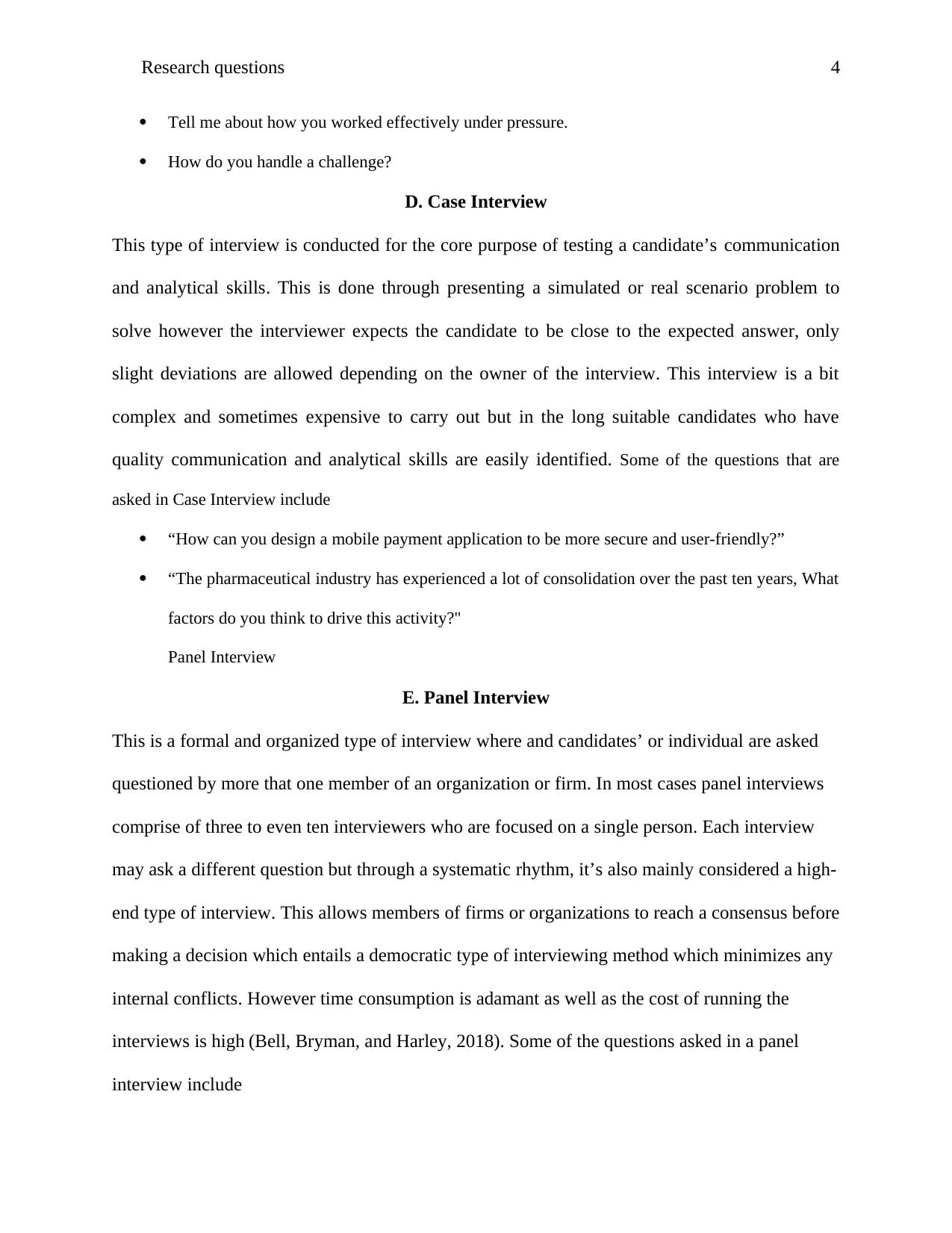
Research questions 4
Tell me about how you worked effectively under pressure.
How do you handle a challenge?
D. Case Interview
This type of interview is conducted for the core purpose of testing a candidate’s communication
and analytical skills. This is done through presenting a simulated or real scenario problem to
solve however the interviewer expects the candidate to be close to the expected answer, only
slight deviations are allowed depending on the owner of the interview. This interview is a bit
complex and sometimes expensive to carry out but in the long suitable candidates who have
quality communication and analytical skills are easily identified. Some of the questions that are
asked in Case Interview include
“How can you design a mobile payment application to be more secure and user-friendly?”
“The pharmaceutical industry has experienced a lot of consolidation over the past ten years, What
factors do you think to drive this activity?"
Panel Interview
E. Panel Interview
This is a formal and organized type of interview where and candidates’ or individual are asked
questioned by more that one member of an organization or firm. In most cases panel interviews
comprise of three to even ten interviewers who are focused on a single person. Each interview
may ask a different question but through a systematic rhythm, it’s also mainly considered a high-
end type of interview. This allows members of firms or organizations to reach a consensus before
making a decision which entails a democratic type of interviewing method which minimizes any
internal conflicts. However time consumption is adamant as well as the cost of running the
interviews is high (Bell, Bryman, and Harley, 2018). Some of the questions asked in a panel
interview include
Tell me about how you worked effectively under pressure.
How do you handle a challenge?
D. Case Interview
This type of interview is conducted for the core purpose of testing a candidate’s communication
and analytical skills. This is done through presenting a simulated or real scenario problem to
solve however the interviewer expects the candidate to be close to the expected answer, only
slight deviations are allowed depending on the owner of the interview. This interview is a bit
complex and sometimes expensive to carry out but in the long suitable candidates who have
quality communication and analytical skills are easily identified. Some of the questions that are
asked in Case Interview include
“How can you design a mobile payment application to be more secure and user-friendly?”
“The pharmaceutical industry has experienced a lot of consolidation over the past ten years, What
factors do you think to drive this activity?"
Panel Interview
E. Panel Interview
This is a formal and organized type of interview where and candidates’ or individual are asked
questioned by more that one member of an organization or firm. In most cases panel interviews
comprise of three to even ten interviewers who are focused on a single person. Each interview
may ask a different question but through a systematic rhythm, it’s also mainly considered a high-
end type of interview. This allows members of firms or organizations to reach a consensus before
making a decision which entails a democratic type of interviewing method which minimizes any
internal conflicts. However time consumption is adamant as well as the cost of running the
interviews is high (Bell, Bryman, and Harley, 2018). Some of the questions asked in a panel
interview include
Paraphrase This Document
Need a fresh take? Get an instant paraphrase of this document with our AI Paraphraser
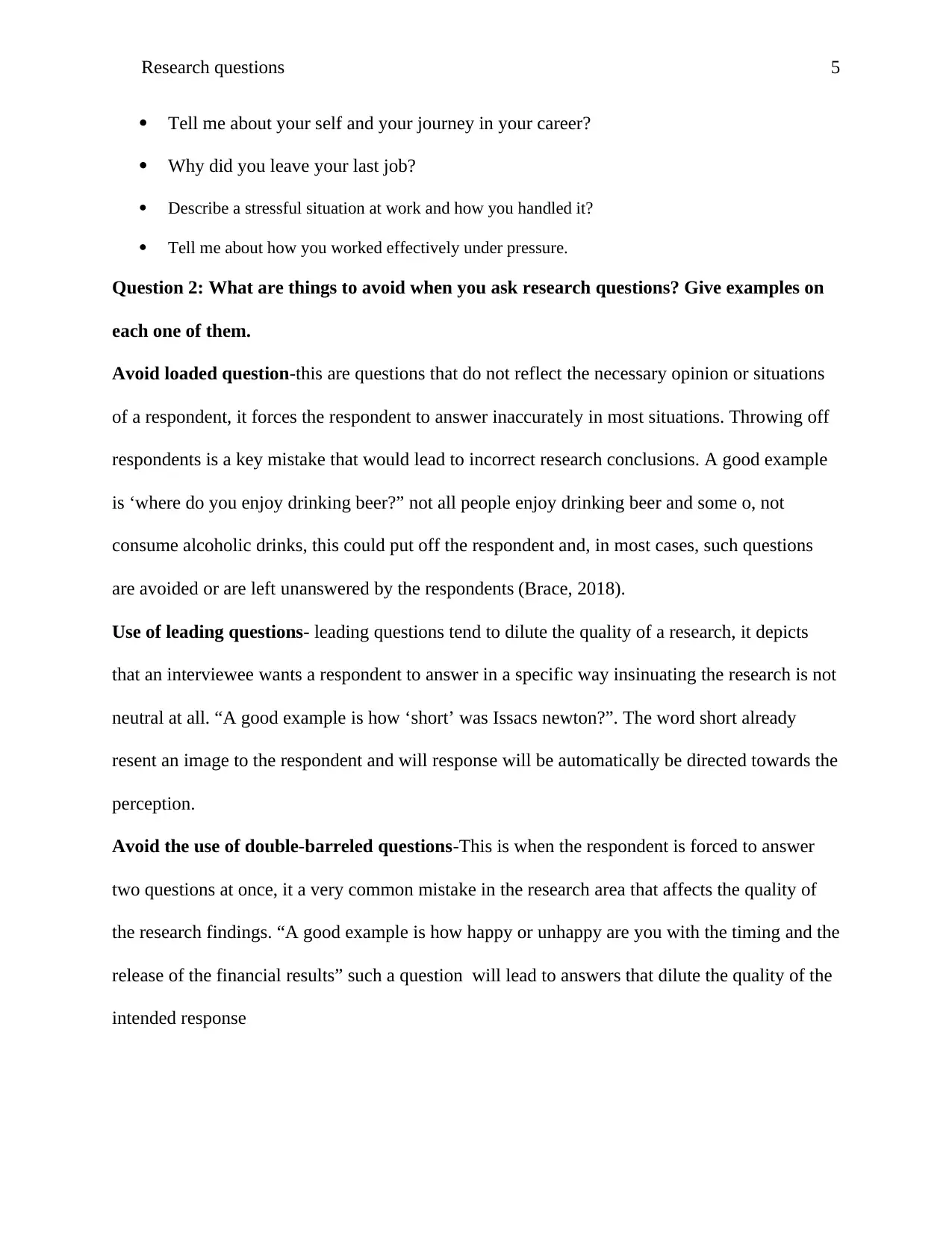
Research questions 5
Tell me about your self and your journey in your career?
Why did you leave your last job?
Describe a stressful situation at work and how you handled it?
Tell me about how you worked effectively under pressure.
Question 2: What are things to avoid when you ask research questions? Give examples on
each one of them.
Avoid loaded question-this are questions that do not reflect the necessary opinion or situations
of a respondent, it forces the respondent to answer inaccurately in most situations. Throwing off
respondents is a key mistake that would lead to incorrect research conclusions. A good example
is ‘where do you enjoy drinking beer?” not all people enjoy drinking beer and some o, not
consume alcoholic drinks, this could put off the respondent and, in most cases, such questions
are avoided or are left unanswered by the respondents (Brace, 2018).
Use of leading questions- leading questions tend to dilute the quality of a research, it depicts
that an interviewee wants a respondent to answer in a specific way insinuating the research is not
neutral at all. “A good example is how ‘short’ was Issacs newton?”. The word short already
resent an image to the respondent and will response will be automatically be directed towards the
perception.
Avoid the use of double-barreled questions-This is when the respondent is forced to answer
two questions at once, it a very common mistake in the research area that affects the quality of
the research findings. “A good example is how happy or unhappy are you with the timing and the
release of the financial results” such a question will lead to answers that dilute the quality of the
intended response
Tell me about your self and your journey in your career?
Why did you leave your last job?
Describe a stressful situation at work and how you handled it?
Tell me about how you worked effectively under pressure.
Question 2: What are things to avoid when you ask research questions? Give examples on
each one of them.
Avoid loaded question-this are questions that do not reflect the necessary opinion or situations
of a respondent, it forces the respondent to answer inaccurately in most situations. Throwing off
respondents is a key mistake that would lead to incorrect research conclusions. A good example
is ‘where do you enjoy drinking beer?” not all people enjoy drinking beer and some o, not
consume alcoholic drinks, this could put off the respondent and, in most cases, such questions
are avoided or are left unanswered by the respondents (Brace, 2018).
Use of leading questions- leading questions tend to dilute the quality of a research, it depicts
that an interviewee wants a respondent to answer in a specific way insinuating the research is not
neutral at all. “A good example is how ‘short’ was Issacs newton?”. The word short already
resent an image to the respondent and will response will be automatically be directed towards the
perception.
Avoid the use of double-barreled questions-This is when the respondent is forced to answer
two questions at once, it a very common mistake in the research area that affects the quality of
the research findings. “A good example is how happy or unhappy are you with the timing and the
release of the financial results” such a question will lead to answers that dilute the quality of the
intended response
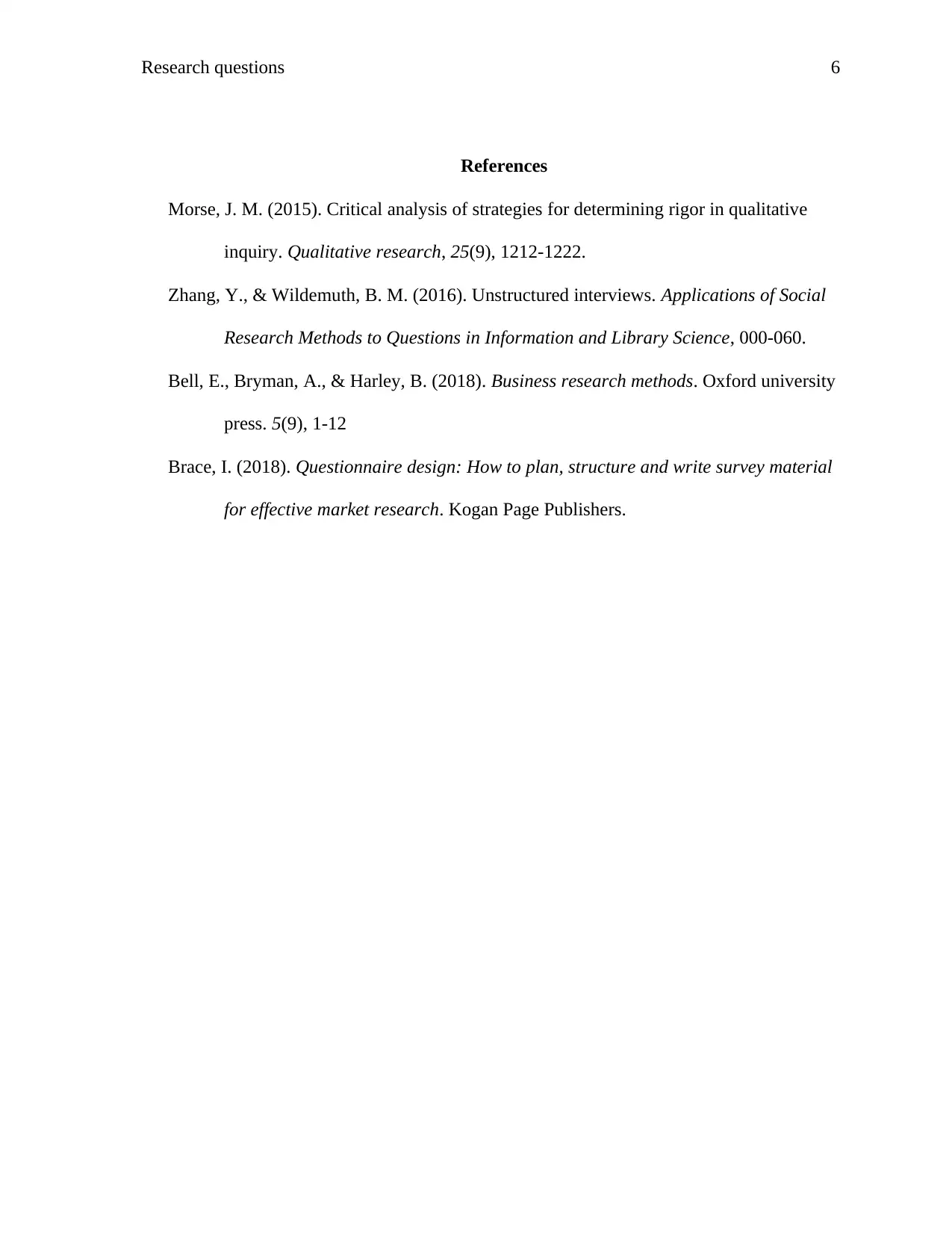
Research questions 6
References
Morse, J. M. (2015). Critical analysis of strategies for determining rigor in qualitative
inquiry. Qualitative research, 25(9), 1212-1222.
Zhang, Y., & Wildemuth, B. M. (2016). Unstructured interviews. Applications of Social
Research Methods to Questions in Information and Library Science, 000-060.
Bell, E., Bryman, A., & Harley, B. (2018). Business research methods. Oxford university
press. 5(9), 1-12
Brace, I. (2018). Questionnaire design: How to plan, structure and write survey material
for effective market research. Kogan Page Publishers.
References
Morse, J. M. (2015). Critical analysis of strategies for determining rigor in qualitative
inquiry. Qualitative research, 25(9), 1212-1222.
Zhang, Y., & Wildemuth, B. M. (2016). Unstructured interviews. Applications of Social
Research Methods to Questions in Information and Library Science, 000-060.
Bell, E., Bryman, A., & Harley, B. (2018). Business research methods. Oxford university
press. 5(9), 1-12
Brace, I. (2018). Questionnaire design: How to plan, structure and write survey material
for effective market research. Kogan Page Publishers.
⊘ This is a preview!⊘
Do you want full access?
Subscribe today to unlock all pages.

Trusted by 1+ million students worldwide
1 out of 6
Related Documents
Your All-in-One AI-Powered Toolkit for Academic Success.
+13062052269
info@desklib.com
Available 24*7 on WhatsApp / Email
![[object Object]](/_next/static/media/star-bottom.7253800d.svg)
Unlock your academic potential
Copyright © 2020–2026 A2Z Services. All Rights Reserved. Developed and managed by ZUCOL.





